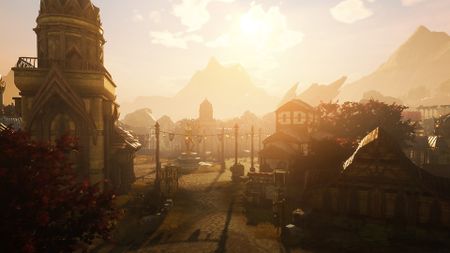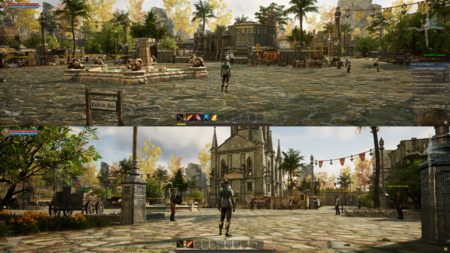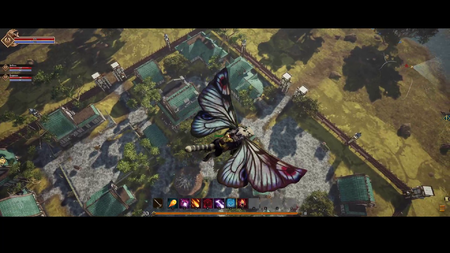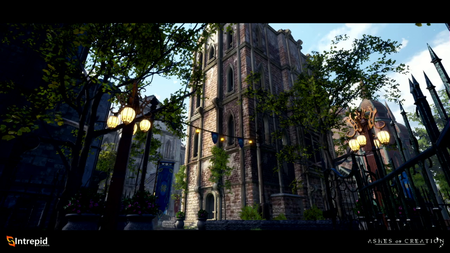Unique node buildings
Each node type has a unique service building associated with it that can be activated at כפר (שלב 3) of node advancement.[2] The unique building plays a central role in the progress of civilization for a server.[3]
List of unique service buildings
- Divine node unique service buildings
- Economic node unique service buildings
- Military node unique service buildings
- Academic node unique service buildings
סוגי צמתים

צמתים קיימים בכל רחבי העולם והמיקום של צומת יקבע את סוגו; אבל סוג הצומת ייראה ... בשלב הראשון של ההתפתחות, כאשר הצומת מתחיל להפיץ סחורות בזמן אמת בעולם; זה בעצם ה- NPCs, הסוחרים האלה שמגיעים לאזור והם מציעים שירותים ו/או שאתה יודע על חנויות או מה שלא תהיה העסקה. אתה תוכל לראות את סוג הצומת מאותם הסוחרים. אז אם זה צומת צבאי אתה תראה אנשי צבא. אם זה ... צומת כלכלי אתה תראה סוחרים. אם זה מדעי תוכל לראות חוקרים; ואם זה צומת שמימי אז תראה כהנים ואנשי דת. ככה שלשחקנים תהיה הבנה מאוד טובה על איזה סוג צומת הוא כל צומת כך שיוכלו לדעת כיצד הם רוצים להתקדם. [4] – Steven Sharif
צמתים מסווגים לאחד מתוך ארבעה סוגי צמתים, לכל סוג יש את המומחיות המיוחדת שלו. [5]
- שחקנים יוכלו לזהות את סוג הצומת בשלב ההתפתחות הראשון שלו (משלחת) לפי סוג אוכלוסיית הדמויות ללא שחקן.[4]
| סוגי צמתים.[5] | מומחיות.[5] | דמויות ללא שחקן.[5] |
|---|---|---|
| צמתים שמימיים | מתמקד באמונה ומיומנויות/שיפור ציוד | כהנים |
| צמתים כלכליים | מתמקד במסחר וסוחרים | סוחרים |
| צמתים צבאיים | מתמקד בקרב וסוגי דמויות | שומרים |
| Academic nodes | מתמקד באומנים | מלומדים |
Ashes of Creation תאפשר לך, השחקן, להחליט על גורל העולם שמסביבך. עם כל סוג צומת, אתה יכול לשנות את שטף המשאבים והסחורות בעולם. האם תגדל את המטרופולין הכלכלי הגדול ביותר ותסייע לנתב את עושרה של Verra, או שתבחר בדרך אחרת שתחשוף סיפורים חדשים מלאים בבעלי ברית ואויבים?[3]
סוגי צמתים הם קבועים מראש וזהים בכל השרתים. [5]
- סוג הצומת הוא סטטי. הוא אינו משתנה בהתאם לפיתוח הצומת או הריסתו.[5]
לדוגמה, אם צומת מדעי ברמה 4 נהרס, הוא יהפוך לצומת מדעי ברמה 0. הוא לעולם לא יהיה כל סוג צומת אחר שאינו צומת מדעי. המיקום של הסוגים האלו קשור להשפעות של האזור הנמצא סביב הצומת. [5] – Margaret Krohn
סוגי צמתים משפיעים על מגוון שירותים ומערכות בכל שלב של פיתוח צומת. [5]
- שלטון הצומת
- עלילה
- דמויות ללא שחקן
- מבני צומת ונוחיות
סוגי הצמתים יהיו סופיים במהלך שלבי בדיקות הBeta.[6]
בדיקת הבטא תדרוש שסוגי הצומתים יהיו סופיים; וזה בגלל האופן שבו סוגי צמתים משולבים לנקודות העניין (points of interest) ההתואמות ולקווי המשימות (quest lines). אז זה לא משהו שאנחנו יכולים להחליף בקלות. [6] – Steven Sharif
Node layout and style

The layout and architecture within a Node’s development area are determined by influential race. For example, a stage 3 Node with the majority of player contribution being Py'rai would have a Py'rai village with Py'rai architecture. Most NPCs would be Py'rai elves, and offer questlines within the Py'rai narrative.[5] – Margaret Krohn
Each player’s contributed experience is flagged with their character race and other identifiers. When a Node advances, the race with the highest experience contribution determines the Node’s style and culture. This style and culture change can happen at every Node Stage. For example, if a Node advances to Level 2 - Encampment Stage and 51% of all experience was earned by Ren’Kai players, the Node will be a Level 2 Ren’Kai Node. If that same Node advances to a Level 3 - Village Stage Node, but the Py'Rai contributed 62% of all the experience earned, then the Node will be a Level 3 Py'Rai Node.[7] – Margaret Krohn
Node layout and style is determined by several factors:[8][9]
- The way that the node system is built is that they can exist across a spread of 18 biomes, but at the same time have to represent the cultural influence of these cultures that are intrinsically a part of a specific biome.[10] – Steven Sharif
- Environment (biome) and location of the node.[10][8][9]
- Nodes will adjust the local topography to fit the aesthetic and mechanical requirements of the node.[11]
- Currently the way that the platform system is set up, is it's capable of adjusting the topography of the node's footprint, regardless of the surrounding terrain. So the reason for that is we want to have flexibility in the presentation of the node's layout and how it is essentially both from an aesthetic standpoint as well as a mechanical standpoint with node sieges- how it's constructed and that construction should have the ability to take on a variance of different types of topography. So it shouldn't be dependent on the surrounding area. Now that's not to say that the surrounding area isn't going to have some influence over. So for example... we're experimenting a little bit with the platform tech and putting up a node up against the side of a mountain or on the edge of a cliff or something that has a beautiful vista. Those are things that we're going to test out obviously as we continue to work on the node tool and how that platform system works, but the idea is to have the node independent of the surrounding terrain.[11] – Steven Sharif
- Some parts are determined by the area it's in. Some parts are determined by the type it is. Some parts are determined by the race it is; and then the rest of it is determined by the mayor.[9] – Jeffrey Bard
- Race that contributed the highest percentage to the node's advancement will alter the racial appearance of its buildings, דמויות ללא שחקן, and props.[12][13][8][7][9][14][15]
- All nodes, whether they're associated with a castle or associated with normal node structure, has cultural influences that replicate over to the buildings that are produced and the NPCs that are present.[17] – Steven Sharif
- The rest is determined by the node's mayor.[9]
- It should be possible for a node to complete several building projects within a mayor's one month term in office.[18]
- Q: How long would you say it will take players on average to fill/build up a node completely from wilderness to metropolis?
- A: It's one thing to get a node to a certain level: it's another thing to develop the node; and I can't really give you an on-average expectation, because there's a lot of variables at play. There's how many citizens does the node have attracted to it; what's the type of traffic that the node is attracting to it based on things like its tax rates, or the specialization that it chose to spec into, based on the building types it's chosen to build. All of those things are variables that can affect the quote-unquote "average build-out time" of a particular node. So it's difficult to give you an average when there's so many variables along those lines. But the idea is that if there is a particular project that players are interested in in developing based on the node stage, that they would have the ability to complete several of those projects as within a single term of a mayor; and a term of a mayor is one month.[18] – Steven Sharif
Racial influences

We have essentially sets that exist across all races; and each race that dons those armor sets is going to have their own racial influence on the presentation of those particular sets. So that's something that's unique in how each of the races get diversified. Additionally, the more that one particular race contributes to a node's development, it's going to manifest in that particular node's architectural influences. You're going to see the architectures of those races become manifest within the nodes as well: That's another way that we diversify each race and we present each race's culture in the game as through those architectures, through those props that exist, through the tailoring of the armor sets that the NPC might wear, to the different factions that exist. Factions will have their own affiliation with different races as well. Each race will also have some different nomenclature when it comes to the lore, or comes to locations in the world. They're going to have their own language influences as well: The way they speak is something that's going to be distinct between races; when you have dialogue trees with particular NPCs. So all of those things really go into setting an immersive world where the cultures have their own identity.[12] – Steven Sharif
Cultural influences manifest in many ways, from node and gear aesthetics to NPC languages and lore.[12][20][7]
- חזות הציוד of certain armor sets is influenced by the player's race.[12]
- Node layout and style is influenced by the race that contributes the most to that node.[12]
- There is an attrition and that attrition on experience and influence is heightened based on the performance of the race in the world. So if all these nodes are Orc nodes then their attrition rate is very high to compete with the cultural establishment of new nodes because they have more influence in the world and a popular opinion is against them in their outlying regions that they do not have influence in.[21] – Steven Sharif
NPC racial interaction
- דמויות ללא שחקן will react differently to different character races.[22]
- Languages will be distinct between NPC races and in the lore.[12]
- Certain quest givers and דמויות ללא שחקן may only be present at nodes with certain cultural influences.[23]
- Depending on the cultural influence of the node activates certain types of quest lines and/or sponsors. Some of those are shared, some of those are general. Some of those relate to a progression path that is a first time user experience. Those will be constant across all culture types. Some of them, however, are predicates that spawn when certain story arcs and/or events, or commissions or buy orders become present within the node; and those might change based on the cultural influence of the node. So there is a separation between those populations.[23] – Steven Sharif
See also
הפניות
- ↑ שידור חי, 2018-09-01 (36:28).
- ↑ שידור חי, 2023-08-31 (56:18).
- ↑ 3.0 3.1 Know Your Nodes: Economic Node Type.
- ↑ 4.0 4.1 שידור חי, 2017-05-04 (15:15).
- ↑ 5.0 5.1 5.2 5.3 5.4 5.5 5.6 5.7 5.8 Blog - Know Your Nodes - The Basics.
- ↑ 6.0 6.1 שידור חי, 2021-08-27 (1:19:43).
- ↑ 7.0 7.1 7.2 7.3 Blog - Know Your Nodes - Advance and Destroy.
- ↑ 8.0 8.1 8.2 שידור חי, 2020-10-30 (39:17).
- ↑ 9.0 9.1 9.2 9.3 9.4 9.5 שידור חי, 2018-09-27 (53:06).
- ↑ 10.0 10.1 שידור חי, 2022-02-25 (41:00).
- ↑ 11.0 11.1 שידור חי, 2021-02-26 (1:12:18).
- ↑ 12.0 12.1 12.2 12.3 12.4 12.5 שידור חי, 2022-03-31 (4:57).
- ↑ פודקאסט, 2021-04-11 (29:47).
- ↑ רֵאָיוֹן, 2018-05-11 (54:34).
- ↑ שידור חי, 2017-05-26 (21:23).
- ↑ פודקאסט, 2021-04-11 (23:36).
- ↑ 17.0 17.1 רֵאָיוֹן, 2018-05-11 (47:27).
- ↑ 18.0 18.1 שידור חי, 2022-07-29 (1:13:09).
- ↑ שידור חי, 2020-06-26 (45:32).
- ↑ 20.0 20.1 רֵאָיוֹן, 2021-02-07 (33:00).
- ↑ 21.0 21.1 רֵאָיוֹן, 2018-05-11 (1:00:19).
- ↑ 22.0 22.1 פודקאסט, 2018-04-23 (29:56).
- ↑ 23.0 23.1 רֵאָיוֹן, 2023-07-09 (1:35:28).
